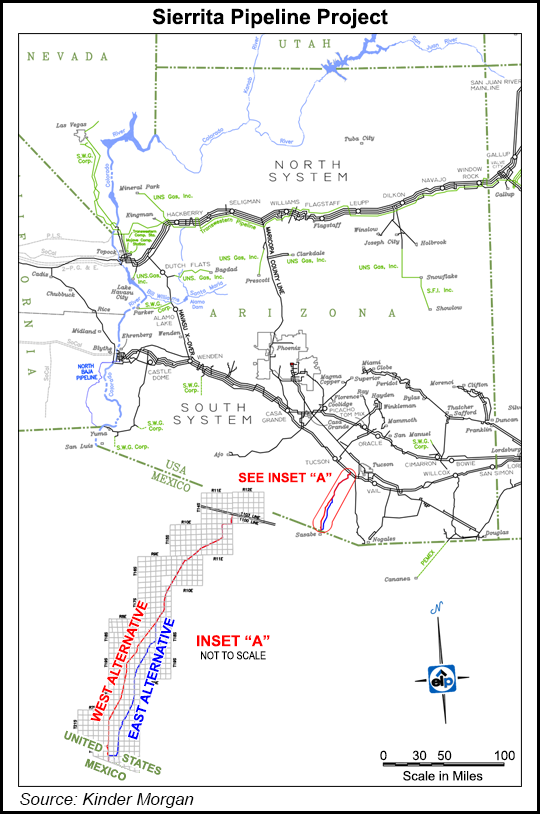Infrastructure | NGI All News Access
KM’s Sierrita Pipeline to Mexico Goes Forward With Local Mitigation
With a mitigation agreement with local county officials signed in mid-June, Kinder Morgan Inc.’s (KM) proposed Sierrita Pipeline link to new natural gas transmission pipelines in northern Mexico won FERC approval Tuesday to begin construction, opening the door wider to future U.S. natural gas exports.

The Federal Energy Regulatory Commission had approved a certificate and a presidential permit in early June authorizing KM unit Sierrita Gas Pipeline LLC to construct a 61-mile, 36-inch diameter lateral from El Paso Natural Gas Co.’s mainline east-to-west interstate system in Arizona to a point near the international border at Sasabe, AZ. The project is estimated to cost $204 million.
Before inking a detailed environmental mitigation agreement, the Pima County elected board three times this spring delayed action on an agreement hammered out in April (see Daily GPI, June 6). To gain approval, KM agreed to monitor the pipeline and surrounding area for 20 years and pay the county $4 million to offset environmental degradation and mitigate the loss of any riparian habitat in the Altar Valley south of Tucson.
In voting unanimously to sign the agreement, the county elected officials had said it was doubtful local jurisdiction could block FERC’s authorization of the project, which is a key link to expand gas exports to Mexico. Other U.S. operators, such as Sempra Energy, have won contracts to build new gas pipeline and other infrastructure for the Mexican government (see Daily GPI, Feb. 26, 2013; Oct. 24, 2012).
In addition, in May the U.S. Fish and Wildlife Service issued a draft “compatibility determination,” making it possible for the pipeline project to use 12 miles of roads in the Buenos Aires National Wildlife Refuge during construction.
In giving the okay for the project, FERC concluded that the Sierrita pipeline “has taken steps to minimize any adverse impacts on landowners and surrounding communities.” FERC said benefits of the lateral and the mitigation measures to lessen its adverse impacts allowed it to meet threshold requirements for pipelines trying to add new legs. One of those requirements is that the addition be financially self-supporting with no subsidization from existing pipeline customers. The public benefits also have to outweigh “residual adverse effects,” and the Sierrita project was found to meet this economic test.
MGI Supply Ltd. has already signed a 25-year binding deal with the new pipeline.
“Sierrita Pipeline will serve new demand for gas transportation by MGI Supply Ltd. delivering natural gas to the border crossing facilities and on to Mexico; Sierrita’s services will not replace any existing services by other pipelines,” FERC concluded.
© 2024 Natural Gas Intelligence. All rights reserved.
ISSN © 1532-1231 | ISSN © 2577-9877 |
